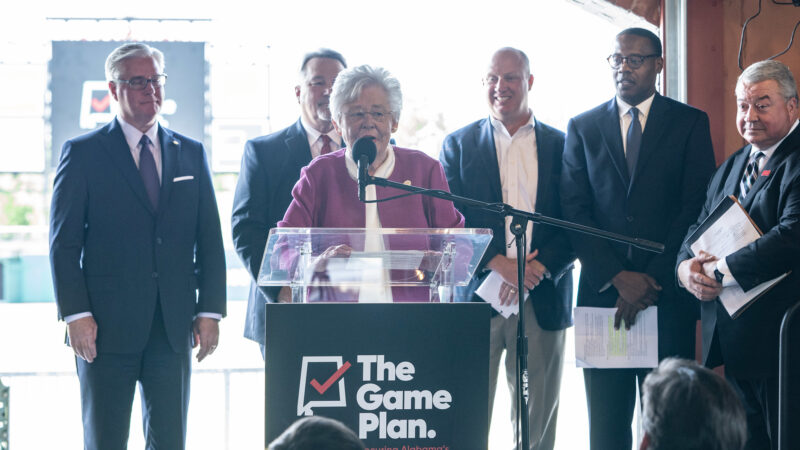Alabama leaders propose four bills to boost state’s economic competitiveness
Gov. Kay Ivey gave remarks as she gathered with other state officials at a press conference to announce a package of economic development bills, Monday May 3, 2023 in Montgomery, Ala.
By Alander Rocha, Alabama Reflector
Gov. Kay Ivey and the legislative leadership Monday called for passage of four bills aimed at making Alabama more economically competitive with neighboring states.
These bills build on and strengthen the Alabama Jobs Act and the Growing Alabama program to keep Alabama competitive for new investments and jobs, said Secretary of Commerce Greg Canfield.
“The Alabama Jobs Act and Growing Alabama, and all that we offer here in Alabama, has been transformational in our state, and most importantly, for our hard-working families,” Ivey said during an event at the Montgomery Riverwalk Stadium.
The four bills have not been introduced yet, but Senate Minority Leader Bobby Singleton, D-Greensboro, said that “The Game Plan,” as it was pitched by the administration, will be priority number one for legislators when they return from spring break.
The first act would extend the Alabama Jobs Act and the Growing Alabama program and increase the Act’s incentive caps by $25 million per year for the next five years. It also would also add renewable energy projects to the Jobs Act.
In 2021, projects associated with the Alabama Jobs Act created about 2,300 jobs, according to the Legislative Fiscal Office. Gina Maiola, spokesperson for the Governor’s office, said they expect these bills to have similar outcomes.
According to the Bureau of Labor Statistics, about 2.2 million people were employed in Alabama in January.
Singleton said these bills will provide more opportunities for economic development in rural areas, as well as be more inclusive by targeting veterans, women and minority business ownership.
“With this Jobs Act, we want to continue to provide more high wages to the citizens across the state to be able to raise the median household income.” Singleton said.
The second bill in the package, the Site Evaluation and Economic Development Strategy (SEEDS) Act, would allow the State Industrial Development Authority (SIDA) to help develop industry sites, with the goal of speeding up the process.
Alabama House Speaker Nathaniel Ledbetter, R-Rainsville, said that the SEEDS act would provide at least 25% of the credits reserved for rural counties, which he said will improve the state’s economy.
Another component of “The Game Plan” is the Innovation and Small Business Act. This bill would establish the Alabama Small Business Credit to businesses “that operate in innovative industries, as well as make $25 million available per year for the Innovating Alabama Tax Credit to support these efforts.
House Minority Leader Anthony Daniels, D-Huntsville, said that this legislation enables Alabama to expand entrepreneurship, drive economic growth and transform the state as a hub for technology and innovation.
“I believe that enhancing funding opportunities and incentives for the tech accelerators and high-tech companies in the state of Alabama and outside of the state of Alabama will also spur future growth and long-term growth for generations to come for the state of Alabama,” he said.
The fourth piece of legislation would provide for transparency by requiring the Alabama Department of Commerce to publish certain incentivized project information on its website, along with company information, estimated capital investment, number of jobs created, estimated hourly wage, and the estimated value to the incentives.
Lt. Gov. Will Ainsworth said that economic incentives are important, but the state also needs to be transparent about those incentives.
“All past and future receipts of incentives would be made public so taxpayers can feel confident on how their tax dollars are spent,” he said.
“We cannot predict what the economy of tomorrow will be like,” Ivey said. “No one can we say where we will be in five years. So, we must create stability by moving this following.”
Park Fire in California could continue growing exponentially, Cal Fire officer says
Cal Fire has confirmed that over a hundred structures have been damaged in the Park Fire, which grew overnight near Chico, Calif. Difficult firefighting conditions are forecast through Friday night.
Checking in with Black voters in Georgia about the election, now that Biden is out
Some voters who could be key to deciding who wins Georgia. What do they think about Vice President Harris becoming the frontrunner in the race to be the Democratic nominee?
Tahiti’s waves are a matter of ‘life and death’ for surfing Olympics
Tahiti's Teahupo'o wave has a slew of riders for the Paris 2024 Olympics. NPR finds out why it's called one of the most dangerous waves.
Researchers are revising botanical names to address troubling connotations
Since the mid-1700s, researchers have classified life with scientific names. But some of them have problematic histories and connotations. The botanical community is trying to tackle this issue.
A spectacular opening ceremony wowed a global audience despite Paris’ on-and-off rain
The Paris Olympics opening ceremony wowed Parisians, fans and most everyone who was able to catch a glimpse of thousands of athletes floating down the Seine to officially begin the Games.
Kamala Harris faces racism and sexism as she moves closer to presidential nomination
As Vice President Kamala Harris ramps up her campaign for president, Republicans are trying out new — and old — attacks focused on her race and gender, including calling her a "DEI candidate."


